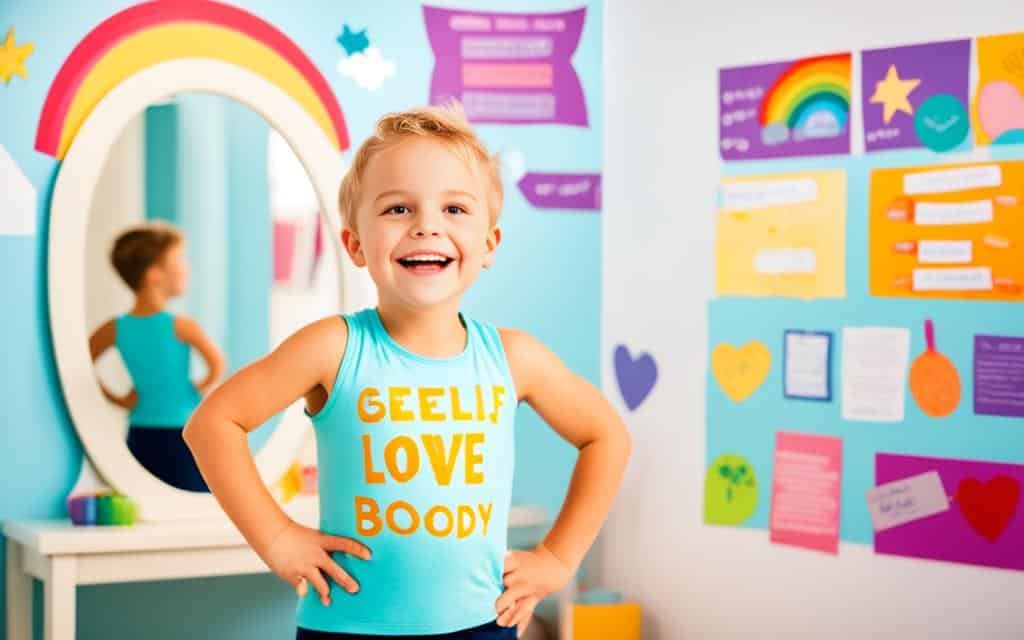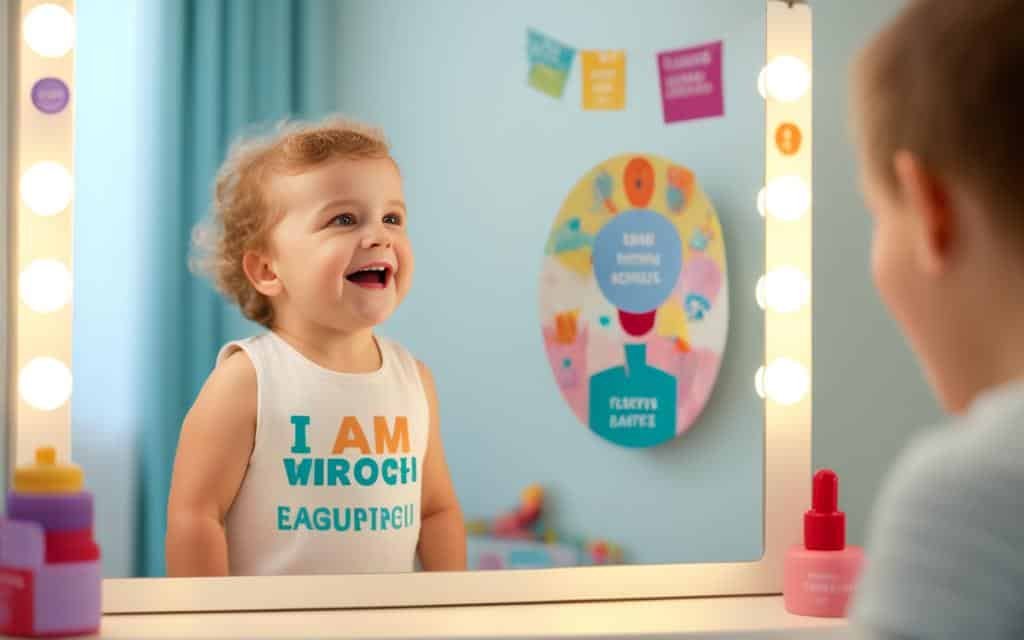Dear parent,
As a parent, you want nothing more than to see your child grow up happy, confident, and comfortable in their own skin. You strive to create a safe and nurturing environment where they can flourish and develop a strong sense of self. But in today’s society, children are increasingly exposed to unrealistic beauty standards and societal pressures that can impact their body image and self-esteem.
It is heartbreaking to see your child struggle with negative thoughts about their appearance or feel the need to conform to societal norms. That’s why it’s crucial to address body image issues from an early age and foster a healthy self-image that will empower your child to navigate the challenges of growing up with confidence and self-acceptance.
In this article, we will delve into the topic of body image for kids and provide you with practical tips and advice to help boost your child’s confidence. We will explore the importance of promoting positive self-image in children, discuss strategies to enhance their young self-esteem, and offer insights to foster a healthy self-image in youth. Together, we can create an environment where your child feels valued, loved, and proud of who they are.
Key Takeaways:
- Understanding the importance of body image for kids
- Developing a positive body image for kids
- What parents can do to encourage a healthy body image for kids
- Overcoming media influence on young body image and self-esteem
- Nutrition and exercise as building blocks for a strong self-image
Understanding the Importance of Body Image for Kids
Body image plays a crucial role in the development of young self-esteem and overall well-being. As children grow and navigate the world around them, it’s vital to cultivate a healthy body image that fosters positive self-perception and body positivity.
Poor body image for kids can have detrimental effects on their mental and emotional health. Children who struggle with negative body image may experience low self-esteem, body dissatisfaction, and an increased risk of developing eating disorders. It’s important for parents and caregivers to understand the impact of body image on children’s well-being and take proactive steps to support healthy body image development.

Body image begins to develop in childhood, influenced by various factors such as societal standards, media portrayal of idealized bodies, and peer influence. Early intervention and promotion of a positive body image are essential to counteract negative influences and lay a foundation of self-acceptance and self-confidence.
The Negative Effects of Poor Body Image on Kids
Poor body image for kids can have significant implications for children’s mental and emotional health. Some of the negative effects of negative body image on kids include:
- Low self-esteem: Children with poor body image may struggle with feelings of inadequacy, leading to lower self-esteem and self-worth.
- Body dissatisfaction: Negative body image can result in dissatisfaction with one’s physical appearance, leading to a continuous focus on perceived flaws and an overall negative view of the body.
- Risk of eating disorders: Children who develop a negative body image are at higher risk of developing eating disorders, such as anorexia nervosa or bulimia, as they strive to attain the perceived ideal body.
By understanding the negative effects of poor body image, parents and caregivers can take proactive steps to promote a healthy body image in their children. Early intervention and fostering positive self-perception are vital for cultivating body positivity and empowering kids to embrace their unique selves.
| Negative Effects of Poor Body Image on Kids |
|---|
| Low self-esteem |
| Body dissatisfaction |
| Risk of eating disorders |
Developing a Positive Body Perception in Childhood
During childhood, a child’s perception of their body can be influenced by various factors, including societal standards, media influence, and peer pressure. As a parent, it is crucial to help your child develop a positive body perception to promote a healthy self-image and raise confident kids.
One strategy to promote children’s body positivity is to foster open and honest communication. Encourage your child to express their feelings and thoughts about their body, and listen attentively without judgment. By doing so, you create a safe space for your child to discuss their body perception and address any concerns or insecurities they may have.
Teaching self-acceptance is also essential in developing a positive body perception. Help your child understand that their worth and value are not determined solely by their physical appearance. Emphasize their unique qualities, talents, and strengths to build their self-esteem and promote self-acceptance.
Another way to promote a positive body image is by ensuring a diverse and inclusive environment. Expose your child to different body types, ethnicities, abilities, and cultures through books, media, and real-life experiences. This helps them understand that beauty and worth come in many forms and encourages them to appreciate their own unique body.
Lifestyle habits
Encouraging a healthy and balanced lifestyle is also key in fostering a positive body perception. Teach your child the importance of nourishing their body with nutritious foods and engaging in physical activities they enjoy. Emphasize the benefits of a healthy lifestyle for overall well-being rather than focusing solely on appearance. By fostering a positive relationship with food and exercise, you can help your child develop a strong and healthy self-image.
As a parent, your words and actions have a significant impact on your child’s body perception. Model self-acceptance, positive body language, and healthy body talk. Avoid making negative comments about your own body or others’ appearances. By promoting self-acceptance and positive body image, you empower your child to develop a healthy self-image and navigate societal pressures with confidence.
By implementing these strategies and techniques, you can play a vital role in promoting positive self-image in children, raising confident kids, and fostering a healthy self-image in youth. Together, we can empower the next generation to embrace their uniqueness and love themselves wholeheartedly.
What Parents Can Do to Encourage a Healthy Body Image
In order to build positive body image in kids and empower their self-perception, parents play a crucial role in creating a supportive home environment. By fostering positive self-esteem, parents can help their children develop a healthy body image that goes beyond physical appearance.
Here are some actions parents can take to encourage a positive body image in their children:
- Lead by example: Show your child that body diversity is beautiful and that taking care of oneself is important. Promote a balanced and healthy lifestyle that includes regular exercise, nutritious meals, and self-care activities.
- Focus on strengths: Encourage your child to recognize and celebrate their unique qualities and talents. Teach them to value their abilities and achievements, rather than solely focusing on their physical appearance.
- Promote media literacy: Help your child develop critical thinking skills by discussing and analyzing media messages together. Teach them to question unrealistic beauty standards and showcase diverse representations of body types and abilities.
- Encourage self-acceptance: Teach your child to appreciate and accept their body as it is. Promote self-compassion and discourage comparing themselves to others. Encourage them to focus on their strengths and positive qualities.
- Communicate openly: Create a safe and non-judgmental space for discussions about body image. Encourage open conversations about emotions, insecurities, and societal pressures. Validate their feelings and provide guidance and support.
- Provide positive affirmations: Teach your child to use positive affirmations to counter negative self-talk. Help them develop a sense of self-worth and confidence by regularly reinforcing positive statements about themselves.
By implementing these strategies, parents can play a vital role in nurturing their child’s self-esteem and overall well-being. Remember, building a positive body image is an ongoing process that requires patience, understanding, and continuous support.

Overcoming Media Influence on Young Body Image and Self-Esteem
Examine the influence of media on young body image and self-esteem. The portrayal of unrealistic beauty standards in the media can have a significant impact on how children perceive themselves. It is crucial for parents to take proactive steps to help their children navigate and challenge these influences.
Teaching media literacy is essential to developing critical thinking skills in children. By educating them about how media messages are constructed and the tactics used to manipulate images, children can learn to analyze and evaluate media content critically. This empowers them to challenge unrealistic beauty standards and develop a healthier perspective on body image.
Limiting social media exposure is another important strategy for promoting positive body image. While social media can be a platform for positive content, it is also saturated with edited and filtered images that can distort reality. Encourage your child to use social media mindfully and set boundaries on screen time to ensure a healthy balance.
Furthermore, promoting positive content consumption is key. Encourage your child to follow social media accounts and websites that promote diversity, body positivity, and self-acceptance. By curating their media consumption, children can surround themselves with messages that uplift and inspire them.
To illustrate the impact of media on body image and self-esteem, consider the following table:
| Media Influence | Effect |
|---|---|
| Unrealistic beauty standards | Leads to body dissatisfaction and low self-esteem |
| Comparisons with social media influencers | Can trigger feelings of inadequacy and self-criticism |
| Negative body talk in media | Impacts self-perception and contributes to body shame |
| Lack of representation and diversity | Creates feelings of exclusion and reinforces stereotypes |
By addressing media influence, teaching media literacy, limiting social media exposure, and promoting positive content consumption, parents can help protect their children from the negative impact of media on body image and self-esteem. These strategies empower children to develop a healthy and positive body image, fostering confidence and self-acceptance.

Nutrition and Exercise: Building Blocks for a Strong Self-Image
When it comes to building a strong self-image, nutrition and exercise play a crucial role. By prioritizing healthy habits, you can help your child develop a positive relationship with their body and boost their self-esteem. A balanced diet and regular physical activity have numerous benefits that go beyond physical health.
A nutritious diet provides essential nutrients that support brain function, mood stability, and overall well-being.
Here are some practical tips to promote healthy eating habits:
- Offer a variety of fruits, vegetables, whole grains, and lean proteins in meals and snacks.
- Involve your child in meal planning and preparation to encourage autonomy and a positive relationship with food.
- Limit sugary drinks and opt for water or milk instead.
- Model healthy eating habits yourself and create a positive eating environment at home.
In addition to nutrition, regular physical activity is essential for boosting self-image.
The benefits of exercise extend beyond physical fitness:
- Improves mood and reduces symptoms of anxiety and depression.
- Enhances cognitive function and concentration.
- Builds resilience and self-discipline.
- Fosters a sense of accomplishment and self-confidence.
Consider these tips for incorporating exercise into your child’s routine:
- Encourage daily physical activity, such as bike riding, swimming, or dancing.
- Participate in fun and active family outings, like hiking or playing sports together.
- Limit sedentary activities, such as screen time, and encourage outdoor play.
- Promote sports or other physical activities that your child enjoys.
By prioritizing nutrition and exercise, you provide the building blocks for a strong self-image in your child. Remember, it’s important to emphasize the link between these healthy habits and overall well-being, rather than focusing solely on appearance. Taking a holistic approach to their health will support your child’s self-esteem and positive self-image.
Empowering Kids Through Education and Positive Affirmations
Introduction
Education and positive affirmations are powerful tools for boosting self-esteem and fostering self-love in children. By providing them with knowledge and empowering them with uplifting words, parents can help their kids develop a strong sense of self and build confidence that will carry them through life. In this section, we will explore various self-esteem building activities for kids and discuss the importance of positive affirmations in shaping their self-perception.
Self-Esteem Building Activities for Kids
Engaging children in self-esteem building activities can have a profound impact on their overall confidence and well-being. Here are a few activities parents can try:
- Journaling: Encourage your child to write down their thoughts, feelings, and achievements in a journal. This allows them to reflect on their positive qualities, accomplishments, and aspirations.
- Artistic Expression: Provide art supplies and encourage your child to express themselves creatively through drawing, painting, or crafting. This helps them explore their emotions and boosts their self-expression.
- Role-Playing: Create scenarios where your child can take on different roles and practice problem-solving and decision-making skills. This builds their self-confidence and fosters empathy.
- Team Building Activities: Engage your child in activities that promote teamwork, collaboration, and communication skills. This helps them develop self-assurance and a sense of belonging.
- Positive Self-Talk: Encourage your child to practice positive self-talk by repeating affirmations such as “I am capable,” “I am valued,” and “I am deserving of love and respect.” This reinforces positive self-beliefs.
The Power of Positive Affirmations
Positive affirmations play a crucial role in shaping a child’s self-perception. By regularly using positive statements, children can rewire negative thought patterns and develop a more positive and empowering mindset. Here are some tips for using positive affirmations with your child:
- Be Consistent: Encourage your child to practice affirmations daily, ideally in the morning or before bedtime. Repetition helps reinforce positive beliefs.
- Make Them Personal: Tailor affirmations to your child’s unique qualities and aspirations. This personalization enhances their relevance and impact.
- Encourage Self-Creation: Involve your child in creating their own affirmations. This empowers them to take ownership of their self-beliefs and reinforces their sense of autonomy.
- Model Positive Self-Talk: Lead by example and demonstrate positive self-talk in your daily life. Your child will learn from your behavior and internalize these positive habits.
Conclusion
In conclusion, nurturing a positive body image in children is crucial for boosting their confidence and fostering healthy self-esteem. By understanding the importance of body image for kids, parents can take proactive steps to promote a positive self-perception from an early age.
Throughout this article, we’ve discussed various strategies and techniques that parents can utilize to encourage a healthy body image in their children. By creating a supportive home environment, engaging in open and sensitive discussions, and teaching media literacy skills, parents can help their kids navigate societal pressures and develop a strong sense of self-worth.
Additionally, focusing on nutrition and exercise as building blocks for a strong self-image can have a profound impact on children’s well-being. Encouraging healthy habits and engaging in self-esteem building activities further contribute to their confidence and self-love.
By implementing these tips and advice, you can play an active role in shaping your child’s body image, promoting positive self-esteem, and equipping them with the tools necessary to navigate the complexities of the world with confidence.
FAQ
What is body image and why is it important for kids?
How does body image develop in childhood?
Body image development starts early in childhood and is influenced by various factors such as societal standards, media influence, and peer pressure. Messages from family, friends, and media can shape a child’s perception of their body.
What can parents do to promote a positive body image in their children?
Parents can encourage a healthy body image for kids by creating a supportive home environment that promotes positive self-esteem. Open discussions about body image with sensitivity and focus on qualities beyond physical appearance. Encourage your child to appreciate their uniqueness and emphasize the importance of self-acceptance.
How can parents help children navigate media influence on body image and self-esteem?
Teaching media literacy and critical thinking skills is essential. Parents can limit social media exposure, monitor content consumption, and promote positive media representation. Encourage discussions about unrealistic beauty standards and help your child challenge them.
How does nutrition and exercise affect a child’s self-image?
Nutrition and exercise play a crucial role in building a strong self-image. A balanced diet and regular physical activity promote overall well-being and self-esteem. Parents can model healthy eating habits, involve kids in meal planning, and encourage daily exercise routines.
What are some ways to empower children through education and positive affirmations?
Parents can engage in self-esteem building activities with their kids, such as art projects, journaling, or reading books with positive messages. Encourage the use of positive affirmations to help children develop a confident and positive self-perception.
How can I continue to support my child’s confidence and self-esteem?
Keep providing a supportive environment, open communication, and positive reinforcement. Encourage your child to pursue their passions and celebrate their achievements. Teach them resilience and self-compassion, and continue fostering a positive body image by challenging societal beauty ideals.










